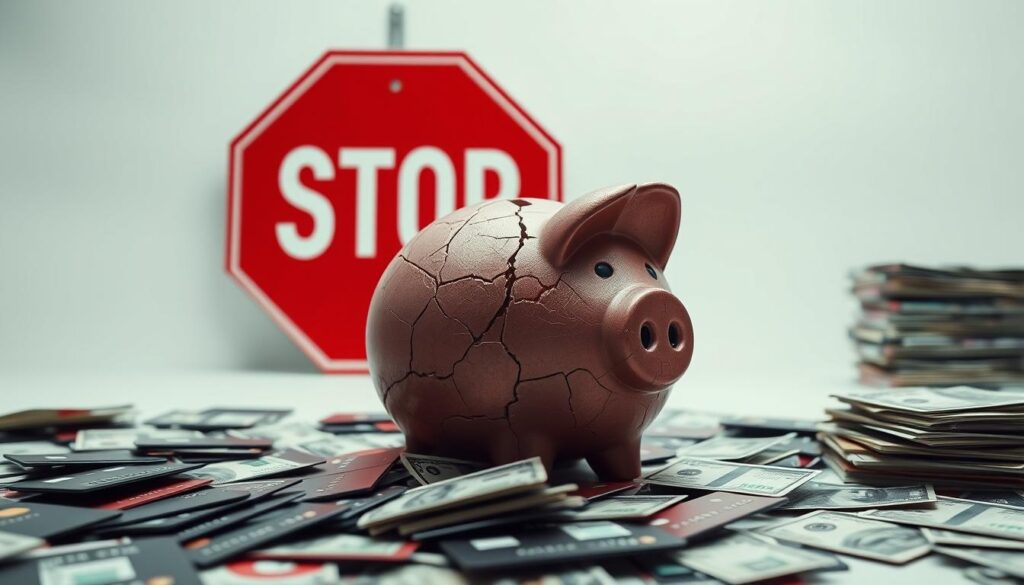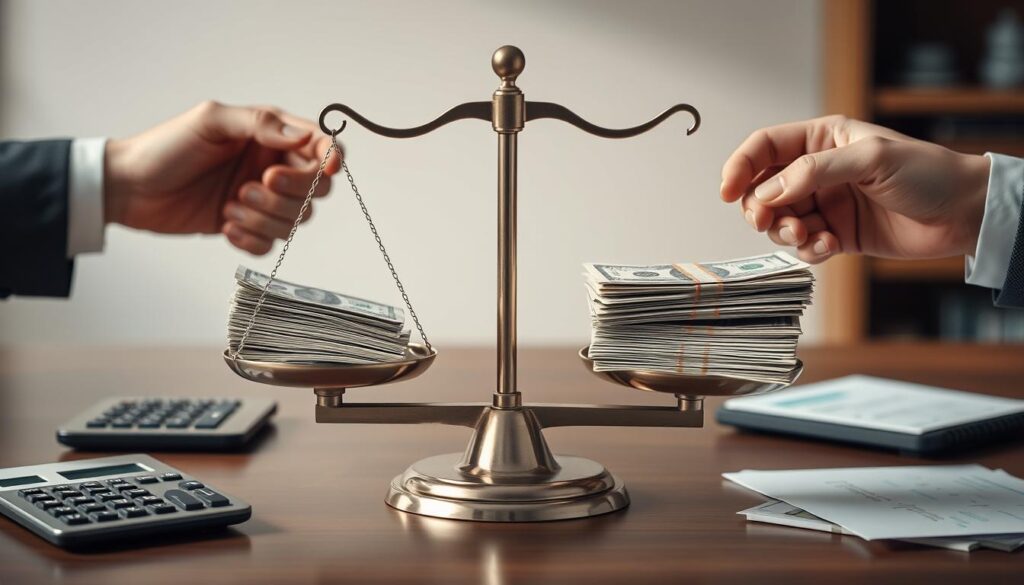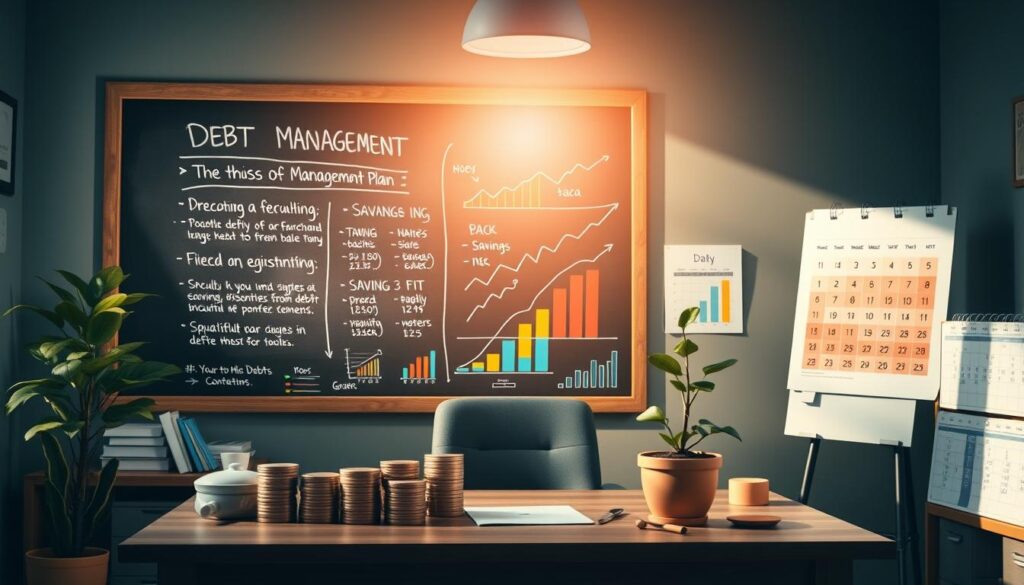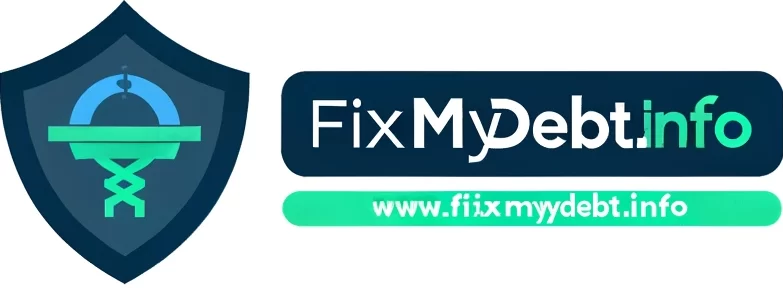Did you know paying just $100 a month on a $5,000 credit card with 20% interest takes over 9 years? But, doubling that payment to $200 can clear the debt in 2.75 years1. This shows how important managing debt is for financial freedom. With thousands of dollars in debt, the path to being debt-free seems tough. But, knowing how debt works and using smart strategies can help me get back on track financially.
This article will cover ways to get rid of debt, like budgeting and the debt snowball method. It also talks about negotiating with creditors and looking into debt management plans. With the right info, I can take charge of my financial future and work hard to pay off my debt.
Remember, asking for help is not a weakness; it’s a step towards better financial health. Credit counseling offers valuable advice and resources as I start my journey to eliminate debt to eliminate debt2.
Key Takeaways
- Understanding the impact of interest rates can significantly reduce the time it takes to eliminate debt.
- Creating a robust budget is crucial for managing expenses and maximizing debt repayment.
- Effective negotiation with creditors can lead to better payment plans, reducing financial stress.
- Utilizing resources such as credit counseling can provide structured assistance for debt management.
- Exploring debt consolidation options can simplify my repayment strategy.
Understanding Debt and Its Impact on Financial Health
Debt is money borrowed that must be paid back with interest. Knowing about debt is key to my financial health. There are different kinds of debt, like mortgages or student loans, which can help me grow wealth. On the other hand, debts like credit cards or auto loans can hurt my finances.
In the U.S., household debt has grown from $8 trillion in 2004 to $15 trillion by 2021. This is an 88% increase, which is more than double the inflation rate of 44%3. This rise in debt can cause a lot of stress and anxiety, especially for those with lower incomes.
About one in four families in the lowest income group spend over 40% of their income on debt4. It’s important to understand how debt affects my life. By managing my debts well, I can reduce the stress it causes.
Since 77% of U.S. households had debt in 20193, managing debt is crucial. By reviewing my debts and taking steps to reduce them, I can improve my financial health. Ignoring debt can lead to more interest and financial problems, making it vital to know how much I owe and which debts are most pressing.
Debt also has emotional and psychological costs. Having more creditors can increase anxiety and mental stress, as managing multiple debts takes up a lot of mental energy4. By tackling these issues, I can reduce the stress related to my finances and improve my overall well-being.
The First Step: Stop Incurring More Debt
My first step to financial stability is to stop adding to my debt. I use a budget to guide my spending. This way, I make sure my money goes toward my goals, not unnecessary buys.
Creating a Budget
Creating a budget helps me keep track of my money. It shows me where I can save and helps me reach financial freedom. This helps me avoid taking on more debt.
Establishing an Emergency Fund
An emergency fund is key to protecting my money. I aim to save enough for three to six months of living costs. This fund stops me from using credit cards or loans for emergencies, helping me avoid debt.
Importance of Insurance
Having the right insurance is also crucial. It covers me against unexpected costs that could mess up my budget. Good insurance gives me peace of mind and keeps me on track with my financial goals.

To manage credit card debt better, I look into debt management strategies. Staying informed helps me avoid debt and keep control over my finances5.
Effective Debt Payment Strategies
To tackle my debt, I first identify my debts clearly. I list each debt, including interest rates and payment terms. With this info, I can start making smart debt payment strategies. This approach helps me reach financial freedom and reduces stress.
Identifying Your Debts
It’s key to accurately identify debts first. I make a debt inventory with total amounts, interest rates, and payment dates. This list helps me see which debts need urgent attention. Without a budget, people might struggle to pay bills6.
By organizing my debts, I can find ways to save money or pay more towards my debts.
Prioritizing High-Interest Debts
Next, I focus on paying off high-interest debts first. This way, I save money on interest and make my payments go further7. For instance, debt consolidation loans can offer lower rates than credit cards, making budgeting easier and speeding up debt reduction6.
Using the debt snowball strategy or debt avalanche approach keeps me motivated. It helps me stay on track with my debt repayment plans.
How to Use the Snowball Method to Pay Off Debt
The snowball method is a great way to tackle debt. It starts with the smallest debts first. This approach boosts your chances of success and keeps you motivated as you see progress.
Using the debt snowball method can free up $300, $500, or $800 in your budget each month8. It’s best for non-mortgage debts like student loans, medical bills, and credit card balances.

Steps to Implement the Snowball Method
To use the snowball method, follow these steps:
- List your debts from smallest to largest.
- Make minimum payments on all debts except the smallest.
- Use any extra funds to pay off the smallest debt first.
- Once the smallest debt is gone, apply that payment to the next smallest debt.
Start with a $1,000 emergency fund to handle small emergencies8. This fund helps you focus on debt without adding more.
Advantages of the Snowball Method
The snowball method has many benefits:
- It boosts motivation by quickly paying off smaller debts.
- It can cut down repayment time by over five years for many9.
- It helps avoid feeling overwhelmed by focusing on smaller debts first.
While it may not save as much interest as the debt avalanche method, it leads to faster results10. Ramsey Solutions says personal finance is mostly about behavior, not just knowledge8.
For more on debt management, check out this resource.
The Avalanche Method: Paying Off High-Interest Debt First
The avalanche method is a smart way to tackle debt. It focuses on paying off debts with the highest interest rates first. By organizing my debts from highest to lowest interest, I can make my payments more effective11.
This approach helps me save money on interest. It’s a key part of the debt repayment benefits I aim for.
Steps to Use the Avalanche Method
- List out all my debts in order of interest rates, ensuring I have the highest rates at the forefront.
- Allocate any extra funds I can toward the debt with the highest interest rate while maintaining minimum payments on others.
- Continue this cycle until all debts are paid off, focusing on one debt at a time to maintain clarity and motivation.
Benefits of the Avalanche Approach
The avalanche method can save you money in the long run. By tackling high-interest debt first, you avoid more interest charges. Studies show this method can save thousands11.
While it might take longer than the snowball method, it’s often more cost-effective. Using extra payments can save up to $12,000 in interest11.
It’s important to have a financial cushion before starting debt repayment. This prevents taking on more high-interest debt12. As I pay off my highest-interest debts, I improve my financial health and credit score12.
Negotiating with Creditors: A Key Strategy
In my journey to manage financial obligations, negotiating with creditors has proven to be a vital strategy. It’s often beneficial to reach out directly to creditors. This can help reduce fees, lower interest rates, or make repayment plans more manageable. This proactive approach may alleviate some of the pressure from outstanding debts.
Reputable debt settlement companies charge about 20%-25% of the enrolled debt for their services13. If I consider a settlement, proposing a lump sum payment equal to around 30% of the outstanding balance can increase my chances of success13.
Debt negotiation comes with its challenges. Creditors may demand a repayment of 50% or more during negotiations13. The process can take three to four years, as noted by the National Foundation for Credit Counseling14. There’s also no guarantee of success; one debt settlement firm reportedly settled debts for only 11% of its clients14.

To enhance my financial strategy, I understand that setting up a debt management plan with a nonprofit credit counseling agency might yield benefits. These plans can reduce interest rates on credit cards to as low as 8%. This allows for effective debt consolidation13. The monthly payments are tailored to my budget, and remarkably, my credit score doesn’t influence eligibility13. This comprehensive approach aids in gaining control over my financial situation while navigating the intricate world of debt negotiation.
Ultimately, the landscape of debt negotiation demands diligence and informed decision-making. Engaging in direct discussions with creditors and exploring various avenues can offer me the flexibility needed to ease my debt burden. This fosters a responsible financial future.
Understanding Debt Consolidation
Debt consolidation helps me combine many debts into one loan, often at a lower interest rate. This makes managing my payments easier and reduces monthly stress. Over 60% of credit card companies offer low-interest balance transfers for this purpose15. Also, those with high credit scores get the best rates for consolidation loans16.
What is Debt Consolidation?
Understanding consolidation means knowing the different loan types. Home equity loans might have lower rates but use my home as collateral, risking foreclosure if I default16. Teaser rates on consolidation loans are short-term, then rates can go up15. Creditors might lower payments, waive fees, or adjust due dates to help me pay off my debt15.
Is Debt Consolidation Right for You?
Deciding if debt consolidation is right for me needs careful thought. Keeping my credit utilization under 30% is key to avoid harming my score16. New consolidation loans can impact my credit, just like any other loan16. If deals seem too good, they might be scams from debt settlement companies15. It’s important to analyze and plan well to make sure it’s the right choice.
Exploring Debt Settlement Options
Debt settlement is a way to pay less than what you owe by negotiating with creditors. I can do this myself or use a third-party service. But these services might charge 15% to 25% of the settled amount, which can be tough on my finances17.
For those with over $20,000 in credit card debt, Accredited Debt Relief can help settle debts in 2-4 years18. Freedom Debt Relief works with those having at least $7,500 in unsecured debt. They aim to reduce credit card debt and settle it in 24-48 months18. National Debt Relief also targets this amount, aiming to cut debts by an average of 23% after fees18.
Debt settlement can hurt my credit score, making it a risky choice17. It can stay on my credit report for up to seven years. Also, the IRS might tax forgiven amounts as income17.
Debt settlement might lower what I owe, but it comes with risks. Stopping payments during negotiations can lead to legal trouble. I could face late fees, wage garnishments, or liens on my property17. If my unsecured debt is half or more of my income, I should consider debt relief options carefully18.
Whether I go it alone or hire a company, knowing the risks and costs is key. Keeping an eye on my finances while exploring these options can help me achieve a debt-free life.

Embarking on a Debt Management Plan
Dealing with too much debt can feel overwhelming. A debt management plan (DMP) can help. It lets you work with credit counseling agencies to manage your debts better. They talk to creditors for you, making payments easier.
It’s key to know how DMPs work to solve financial problems effectively.
Working with Credit Counseling Agencies
Choosing a good credit counseling agency is crucial. They help you list all your debts, from credit cards to mortgages19. They also help you understand your debt’s interest rates, making it easier to manage your money.
Tracking your spending daily can show where you can save money. This money can then go towards paying off your debts19. Remember, some agencies might charge fees, so pick wisely.
The Benefits and Risks of DMPs
DMPs offer big advantages, like lower interest rates and a single monthly payment19. They can help you pay off debt faster because the agency deals with creditors for you. But, there are risks too.
DMPs might cost money, and they could make it harder to get new credit. Even though they make payments easier, think about how they might affect your credit score in the long run20.

| Aspect | Benefits | Risks |
|---|---|---|
| Interest Rates | Lower rates may apply | Possible fees associated with services |
| Payment Structure | Single monthly payment simplifies budgeting | Affects ability to obtain new credit |
| Debt Resolution | Faster resolution compared to self-management | Long-term impact on credit score |
Knowing the good and bad about DMPs helps you make smart money choices2019.
How Lifestyle Changes Can Help You Remove Debt
In my quest to get rid of debt, I found that changing my lifestyle is key. I now make a point to distinguish between needs and wants. For instance, canceling unnecessary subscriptions helps me save money that I can use to pay off debt. Studies show that too much debt can make it hard to get a mortgage, which might stop me from buying a house21.
Setting clear financial goals helps me stay on track. Writing down my goals makes me 42% more likely to reach them22.
Reassessing Your Spending Habits
Tracking my spending regularly helps me see where my money goes. Making a budget is now a crucial part of my financial planning. Experts say I should spend about 20% of my income on debt repayment22.
Getting my family involved in budgeting also boosts my debt repayment efforts22.
Finding Additional Cash Flow
Increasing my cash flow is vital. I look into getting a part-time job or selling items I no longer need to earn extra money for debt repayment21. The debt snowball method helps too, by focusing on one debt at a time until it’s paid off22.
Building an emergency fund is also important. It keeps me from spending too much on unexpected expenses23.
| Strategy | Description | Benefits |
|---|---|---|
| Budgeting | Creating a written budget to track all expenses. | Prevents overspending and helps manage monthly finances. |
| Cutting Expenses | Identifying and eliminating non-essential expenses. | Free up cash flow for debt repayment. |
| Increasing Income | Taking a side job or selling unused items. | Generates additional funds to address debts. |
| Emergency Fund | Setting aside savings for unexpected costs. | Avoid going back into debt when emergencies arise. |
Using Windfalls Wisely to Reduce Debt
Financial windfalls offer a great chance to improve my debt repayment plans. These can come from bonuses, tax refunds, or surprise gifts. By using a part of these funds to pay off debts, I can reduce my debt quickly.
I focus on debts with high interest rates first, like credit cards, which can have rates over 20%24. Paying off these debts quickly saves me money in interest over time. This leads to faster debt relief25.
It’s important to save enough for any taxes on my windfall. For example, 24% is often withheld for taxes on lottery wins and game show prizes24. This way, I avoid underfunding my repayment plans due to taxes.
I also plan to save some for an emergency fund. I aim for three to six months’ worth of expenses24. This fund helps me avoid new debt during unexpected times. Using windfalls wisely helps me pay off debt and prepares for future emergencies.
When I have cash from my windfall, I try to negotiate with creditors. This can help get better interest rates or settlements25. I also think about investing some to buy a home or diversify into investment properties. This can help secure my financial future26.
By following these strategies, I can make the most of financial windfalls. This helps improve my financial health and makes a big difference in reducing my debt.
Debt Collection Practices: What You Should Know
Understanding debt collection practices is key when facing financial issues. Knowing your consumer rights is crucial. You have the right to dispute debts and must get proof of any claims by collectors. A collector must send a written notice within five days, showing the debt amount, creditor’s name, and how to dispute it27.
Consumer debt has grown each year, from $15.85 trillion in 2022 to $16.90 trillion by year’s end28. It’s vital to know your rights as a consumer. Laws like the Fair Debt Collection Practices Act protect you from unreasonable contact and disclosure of debts27. You can also ask for different call times if they’re inconvenient27.
It’s important to check if a debt is still collectible. The statute of limitations, usually three to six years, can impact your obligations28. Knowing these limits helps you understand your situation, especially with old debts.
You can also negotiate with collectors. This might lead to lower payments or better terms. Setting up a structured repayment plan helps manage your budget. Paying on time shows you’re serious about paying off debts and can stop further actions.
After paying off debts, you can ask for collection accounts to be removed from your credit reports. This can boost your credit score by removing negative marks. So, staying informed about your rights and debt collection practices is key to keeping your finances healthy.
For more details, check out the Federal Trade Commission’s debt collection.
| Debt Collection Aspect | Details |
|---|---|
| Written Notice Requirement | Must be sent within five days of first contact, including amount owed and creditor details27. |
| Contact Limitations | Collectors cannot call between 9 p.m. and 8 a.m27.. |
| Statute of Limitations | Ranges from three to six years on average; can extend up to ten years in some instances28. |
| Legal Action on Debts | Debt collectors can only garnish wages after obtaining a court judgment27. |
| Consumer Rights | I have the right to dispute and verify debts claimed by collectors. |
Maintaining Financial Discipline to Avoid Future Debt
After becoming debt-free, keeping financial discipline is key to stay out of debt. I do this by making a strict budget and checking my credit card statements regularly. This is important for staying disciplined29. Setting up spending alerts also helps with this discipline29.
It’s also crucial to save money. I aim to save three to six months’ worth of living expenses in an emergency fund30. This fund helps me avoid using credit when unexpected expenses arise. It also supports my ongoing debt management efforts.
Smart investing is also important for financial security. By increasing my income and diversifying my investments, I can pay off debt faster and reduce risk30. Starting to invest early is especially beneficial because it grows my wealth over time through compound interest30.
To avoid debt, I must watch out for lifestyle inflation. I make sure to spend less than I earn, even when my income goes up. This way, I stay on track to financial independence and avoid debt.
| Financial Strategy | Description |
|---|---|
| Establish a Budget | Create a detailed plan for income and expenses to monitor financial health. |
| Emergency Fund | Save three to six months’ worth of living expenses to cover unexpected costs. |
| Investment Diversification | Spread investments across various assets to reduce risk and enhance returns. |
| Regular Monitoring | Check credit card statements and set spending alerts to uphold financial discipline. |
| Avoid Lifestyle Inflation | Continue living below means, regardless of income growth, to prevent unnecessary debt. |
Using these strategies helps me avoid debt and keeps my finances secure. I need to keep checking and adjusting my financial habits for lasting success.
By focusing on these areas, I strengthen my commitment to ongoing debt management. This creates a stable financial future for me2930.
Conclusion
Getting out of debt means understanding my debts well and picking the right ways to pay them off. Debt settlement programs can help by reducing what I owe by 15% to 25%31. Debt consolidation is also an option, but it might lower my credit score for a while31.
Every choice I make is important because late payments can hurt my credit for up to seven years31. This can affect about 35% of my FICO Score31.
On my path to financial freedom, knowing my options and getting help when I need it is key31. Credit counselors or financial coaches can guide me through the debt relief process31. By being proactive and dedicated to my financial health, I’m getting closer to a better financial future.
Reaching financial independence is a complex journey. I need to stay alert, check my finances often, and change my plans if needed31. By using smart methods, negotiating with creditors, and making smart financial choices, I can improve my chances of a lasting debt-free life.
FAQ
What is the first step to get out of debt?
What are effective strategies to eliminate debt?
How does the snowball method work?
What is the avalanche method and how does it differ from the snowball method?
Is debt consolidation a good option for me?
What should I know about debt settlement?
How can a debt management plan (DMP) assist me?
How can lifestyle changes help me maintain a debt-free lifestyle?
What rights do I have regarding debt collection practices?
What should I do with financial windfalls like tax refunds?
Source Links
- 7 Tips To Help You Dig Your Way Out Of Debt And Improve Your Credit | Bankrate – https://www.bankrate.com/personal-finance/debt/ways-to-get-out-of-debt/
- How To Get Out of Debt – https://consumer.ftc.gov/articles/how-get-out-debt
- The Impacts of Individual and Household Debt on Health and Well-Being – https://www.apha.org/policies-and-advocacy/public-health-policy-statements/policy-database/2022/01/07/the-impacts-of-individual-and-household-debt-on-health-and-well-being
- Reducing debt improves psychological functioning and changes decision-making in the poor – https://www.ncbi.nlm.nih.gov/pmc/articles/PMC6462060/
- 8 Steps To Get Old Debt Off Your Credit Report | Bankrate – https://www.bankrate.com/personal-finance/credit/how-to-rid-credit-report-of-old-debt/
- Effective Strategies and Tips to Pay Off Debt | Bankrate – https://www.bankrate.com/personal-finance/debt/how-to-pay-off-debt/
- How to Pay Off Debt: 7 Methods to Try – NerdWallet – https://www.nerdwallet.com/article/finance/pay-off-debt
- How to Get Out of Debt With the Debt Snowball Plan – https://www.ramseysolutions.com/debt/get-out-of-debt-with-the-debt-snowball-plan?srsltid=AfmBOopM9xaH0NmkN1NhRWxnjt1KyCgNFWHj1P_UY_njjzoVSpaFQaa7
- Debt Snowball Strategy: How Does It Work? – Experian – https://www.experian.com/blogs/ask-experian/how-does-debt-snowball-work/
- Debt Avalanche vs. Debt Snowball: What’s the Difference? – https://www.investopedia.com/articles/personal-finance/080716/debt-avalanche-vs-debt-snowball-which-best-you.asp
- Debt snowball method vs. debt avalanche method: Which is right for you? | Fidelity – https://www.fidelity.com/learning-center/personal-finance/avalanche-snowball-debt
- What to know about the debt snowball vs avalanche method — Wells Fargo – https://www.wellsfargo.com/goals-credit/smarter-credit/manage-your-debt/snowball-vs-avalanche-paydown/
- DIY Debt Settlement: How to Negotiate with Creditors – https://www.incharge.org/debt-relief/debt-settlement/negotiating-with-creditors/
- How to Negotiate Debt Settlement on Your Own – NerdWallet – https://www.nerdwallet.com/article/loans/personal-loans/debt-settlement-negotiations
- What do I need to know about consolidating my credit card debt? | Consumer Financial Protection Bureau – https://www.consumerfinance.gov/ask-cfpb/what-do-i-need-to-know-if-im-thinking-about-consolidating-my-credit-card-debt-en-1861/
- What Is Debt Consolidation: Does it Hurt Your Credit? | Equifax – https://www.equifax.com/personal/education/debt-management/articles/-/learn/what-is-debt-consolidation/
- What Is Debt Settlement And How Does It Work? | Bankrate – https://www.bankrate.com/personal-finance/debt/what-is-debt-settlement/
- How Does Debt Relief Work? – NerdWallet – https://www.nerdwallet.com/article/finance/find-debt-relief
- Looking to payoff Debt? 14 Debt Pay-Off Tips You Can’t Miss! – https://www.brightmoney.co/learn/14-debt-pay-off-tips-you-cant-miss
- Debt Relief vs. Bankruptcy: Understanding Your Options – https://www.investopedia.com/debt-relief-vs-bankruptcy-understanding-your-options-8419029
- 5 Best Ways To Get Rid of Debt – https://www.debt.org/advice/how-to-get-rid-of-debt/
- Top 10 Tips to Get Out of Debt Quickly – https://credit.org/blogs/blog-posts/10-tips-on-how-to-get-out-of-debt-fast
- How to pay off debt: 7 practical tips – https://www.thrivent.com/insights/budgeting-saving/how-to-pay-off-debt-7-practical-tips
- How to Manage a Windfall – https://www.experian.com/blogs/ask-experian/how-to-manage-a-windfall/
- What to do with a Financial Windfall – https://knowledge.anbtx.com/money-management/budgeting/article/what-to-do-with-a-financial-windfall
- How to Handle a Financial Windfall | Progressive – https://www.progressive.com/lifelanes/turning-points/handle-financial-windfall/
- Debt Collectors – https://oag.ca.gov/consumers/general/debt-collectors
- How To Pay Off A Debt In Collections And Protect Your Finances | Bankrate – https://www.bankrate.com/personal-finance/debt/how-to-pay-off-a-debt-in-collections/
- Maintaining Financial Discipline And Avoiding Future Debt – FasterCapital – https://fastercapital.com/topics/maintaining-financial-discipline-and-avoiding-future-debt.html
- From Debt To Millionaire: A Strategic Path To Financial Freedom – https://www.forbes.com/sites/melissahouston/2024/05/24/from-debt-to-millionaire-a-strategic-path-to-financial-freedom/
- How Long Does Debt Relief Stay On Your Credit Report? – https://www.forbes.com/advisor/debt-relief/how-long-debt-relief-stays-on-credit-report/

